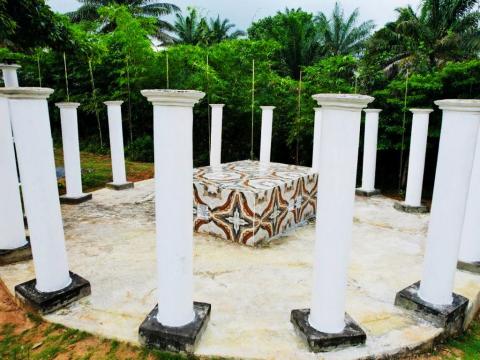By Umaru Fofana
Sierra Leone on Wednesday commemorated the end of the bloody 10-year war waged by the Revolutionary United Front (RUF) and their allies.
The carnage officially ended on 18 January 2002 after tens of thousands of people had either been killed or maimed and millions displaced.
Ceremonies marking the event were held at the civil war memorial at Robis, in the Kaffu Bullom chiefdom in Port Loko District – the scene of where 21 years ago President Ahmad Tejan Kabbah declared, “D WAR DON DON”.
The Center for Memory and Reparations organised the event with partners including the Ministry of Basic Education. It was attended by diplomats and government officials who were joined by 100 pupils drawn from across various schools to mark the day.
The principal of the Centre, Joseph Kaifala, recalled how foreign leaders were present at the place to mark the end of the war.
He said that “in a poignant symbolic gesture president Ahmad Tejan Kabbah burned 3,000 weapons and proclaimed the flame of peace over Sierra Leone with the solemn pronouncement that we shall never again resort to violence to resolve our dispute”.
He said he founded the Center to facilitate the healing process started by the Truth and Reconciliation Commission “because even as our guns were silenced many of us still struggled to survive in the psychological battlefields of our minds where the traumas of war rages on”.
Kaifala said that every Sierra Leonean was affected by the war “one way or another, directly or indirectly”. He said that public acknowledgement of suffering was therapeutic, “therefore remembrance, memorials and memorialisation are fundamental aspects of public acknowledgement of trauma and collective healing”.
The Center has among other things a tomb of the unknown civilians who died during the war, a flame of peace, a peace bell and a conserved forest where people sit around to discuss the culture of peace.
It had been planned that President Julius Maada Bio or Vice President Dr Mohamed Juldeh Jalloh would declare the day – 18 January – as National Reconciliation Day, an annual event to look back on the war and its causes with lessons to learn. But they did not attend the ceremony so the declaration was not made.
But the presidential spokesman and Resident Minister of the Northwest, Alpha Kanu, appealed to politicians to focus on peace and development instead of partisanship and stoking up tension.
Many people have credited the end of the war in Sierra Leone to Nigeria which sent thousands of troops to fight the rebels. Many of their soldiers died in the process.
The Nigerian High Commissioner to Sierra Leone, Henry John Omaku said the history of Sierra Leone, particularly in the struggle to attain peace, would not be complete without the mention of Nigeria.
“I am honoured to be with you today as we pay our respect and commemorate our children who gave up their childhood, their youth and…fought for peace and stability in this beloved country Sierra Leone.”
He said that “in the ashes of this Sierra Leone enjoys peace today. I must congratulate the people of Sierra Leone for making sure these sacrifices were never in vain.”
He said the peace the country enjoyed today was “a worthy trophy”.
Ambassador Omaku said that “it is not enough to win a war, it is more important to organize the peace. With the elections coming up in June, let us look at the children before us and ensure that they have a future they will be grateful for.”
Copyright © 2023 Politico Online (20/01/23)








